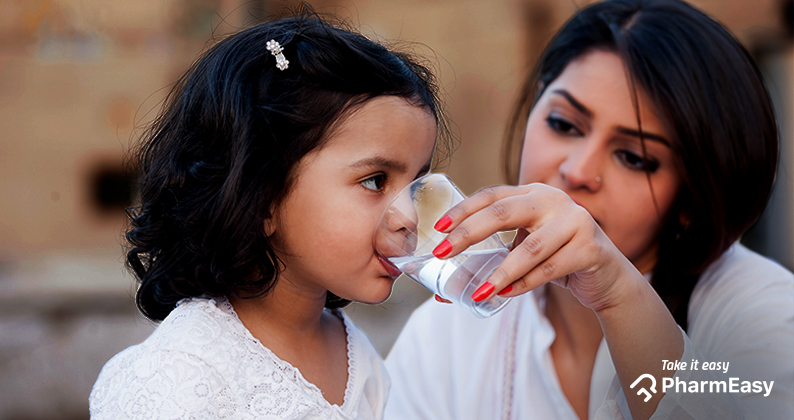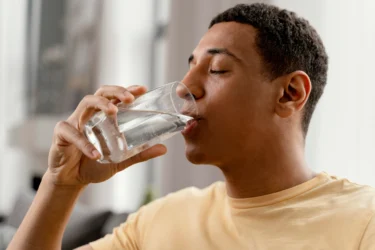Drinking Water Before Bed – Is It A Good Idea?
By Dr. Malavika Athavale +2 more

Get,

to manage your symptom
Get your,


4 Cr+ families
benefitted

OTP sent to 9988776655



You’ve successfully subscribed to receive
doctor-approved tips on
Whatsapp

Get ready to feel your best.

Hi There,
Download the PharmEasy App now!!


Register to Avail the Offer
Send OTPBy continuing, you agree with our Privacy Policy and Terms and Conditions

Hi There,
Sign up on PharmEasy now!!
Trusted by 4 crore+ families

OTP sent to 9988776655



You have unlocked 25% off on medicines




Code: NU25
By Dr. Malavika Athavale +2 more
Table of Contents
Many people enjoy a glass of water before going to bed. If you’re one of them, there’s great news!
Your body loses water even while you sleep. How? First, your body is still working: it burns calories overnight, and that process uses up water. Secondly, you are constantly losing water through breathing and sometimes sweating (especially if your room is warm). Both of these slowly reduce your water reserves. If you have a fever or a condition like diabetes, your body loses fluids even faster than normal during the night1. All of these can cause dehydration while sleeping.

And how can you prevent that? Start your sleep with good hydration! Drinking water before you sleep actually has many good things going for it. Want to learn about the benefits? Keep reading!

When you sleep for 6 to 8 hours, your body stops getting water, in fact it loses water as mentioned above. These can lead to dehydration, causing you to wake up feeling really dry and thirsty. To avoid this, just drink a glass or two of water right before you go to bed2. This helps keep your body hydrated until morning, which in turn has the following advantages:
It is worth noting that drinking water at bedtime might lead to frequent urination at night. This can interrupt your sleep. So, in my experience, it is better that the water intake is met before the bedtime. Drinking small amounts of water throughout the day is a good idea11!
Dr. Siddharth Gupta, B.A.M.S, M.D (Ayu)

When people are well-hydrated at night, experiments suggest they are more relaxed and have more energy when they wake up, compared to those who skip the water5.

Drinking enough water before sleep will improve your blood circulation6. This means, your body will cleanse. It works by delivering important nutrients to your cells and getting rid of toxins. This helps clean and refresh your entire body while you sleep. Drinking water before bed will also help to reduce stomach pain or cramps7. And if you also add some lemon to it, it will help with your cough and cold8.
Though drinking water can clean your body, flush out all toxins, and keep you hydrated, it is a good idea to drink water two hours before you go to sleep10.
Dr. Rajeev Singh, BAMS
While consuming water before sleep is beneficial, a crucial precaution must be observed. Drinking water immediately prior to bedtime is not advisable9.
It is recommended to cease fluid intake at least two hours before your intended sleep time. The reason for this necessity is the potential risk of nocturia, a condition defined by the increased urge to urinate and the resulting need to awaken multiple times during the night.
When sleep is frequently interrupted over an extended duration, it can significantly compromise health, elevating the risk of serious medical conditions such as cardiac issues, diabetes, obesity, and depression. Therefore, strategic timing of fluid consumption is essential to preserve the integrity of your sleep cycle.
Also Read: What Is the Amount of Water Your Body Needs During Summer?
While the consumption of water prior to sleep offers considerable health benefits, it is crucial to time this practice correctly to achieve maximum efficacy. To gain the greatest advantage, one objective should be to consume water at least 1.5 hours before the planned time of rest. Adhering to this specific timeframe will ensure that the body reaps the full benefits of this practice.
Also Read: 6 Health Benefits of Drinking Water in The Morning
Disclaimer: The information provided here is for educational/awareness purposes only and is not intended to be a substitute for medical treatment by a healthcare professional and should not be relied upon to diagnose or treat any medical condition. The reader should consult a registered medical practitioner to determine the appropriateness of the information and before consuming any medication. PharmEasy does not provide any guarantee or warranty (express or implied) regarding the accuracy, adequacy, completeness, legality, reliability or usefulness of the information; and disclaims any liability arising thereof.
Links and product recommendations in the information provided here are advertisements of third-party products available on the website. PharmEasy does not make any representation on the accuracy or suitability of such products/services. Advertisements do not influence the editorial decisions or content. The information in this blog is subject to change without notice. The authors and administrators reserve the right to modify, add, or remove content without notification. It is your responsibility to review this disclaimer regularly for any changes.
Comments

Leave your comment...
You may also like
Comments